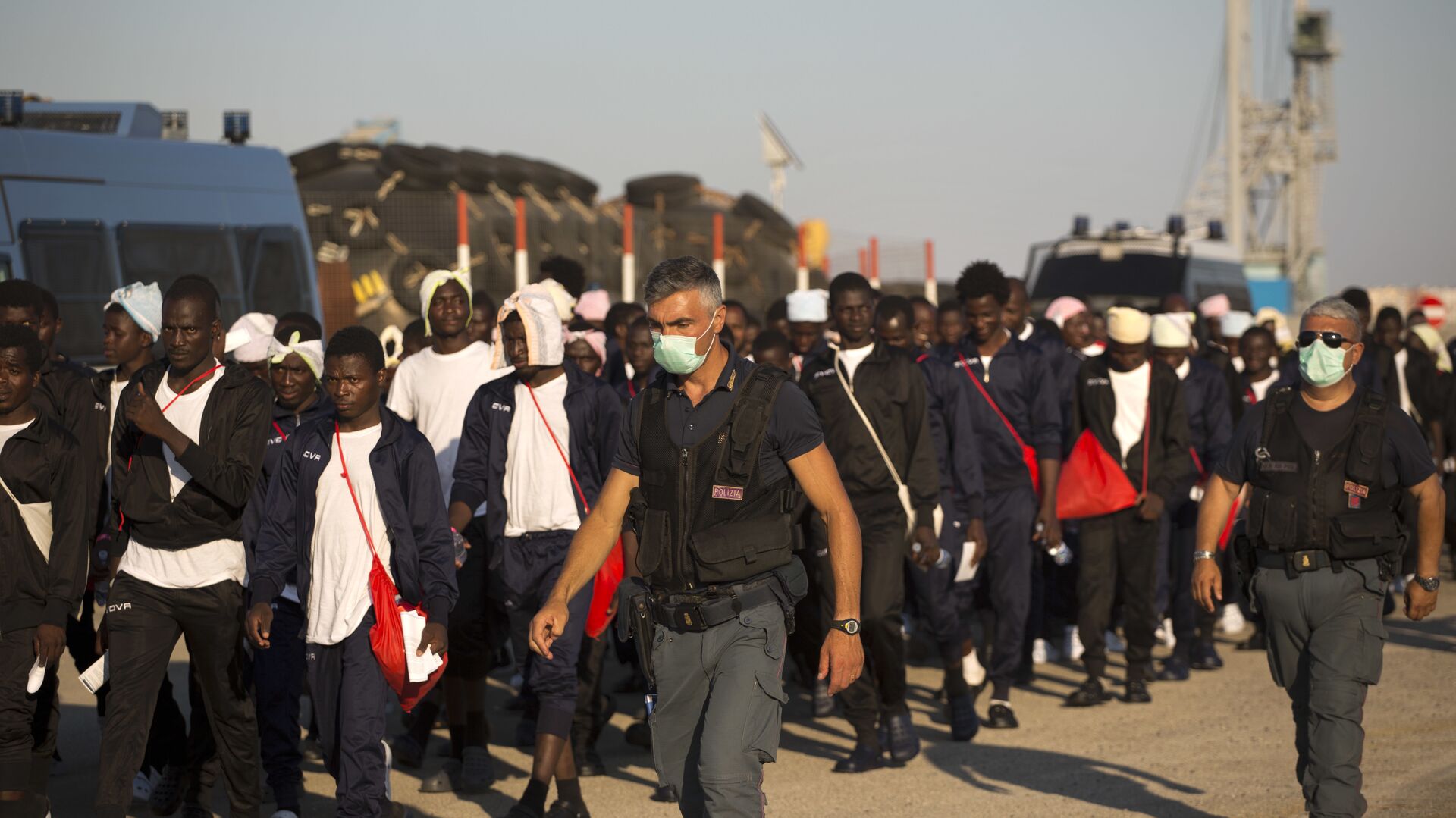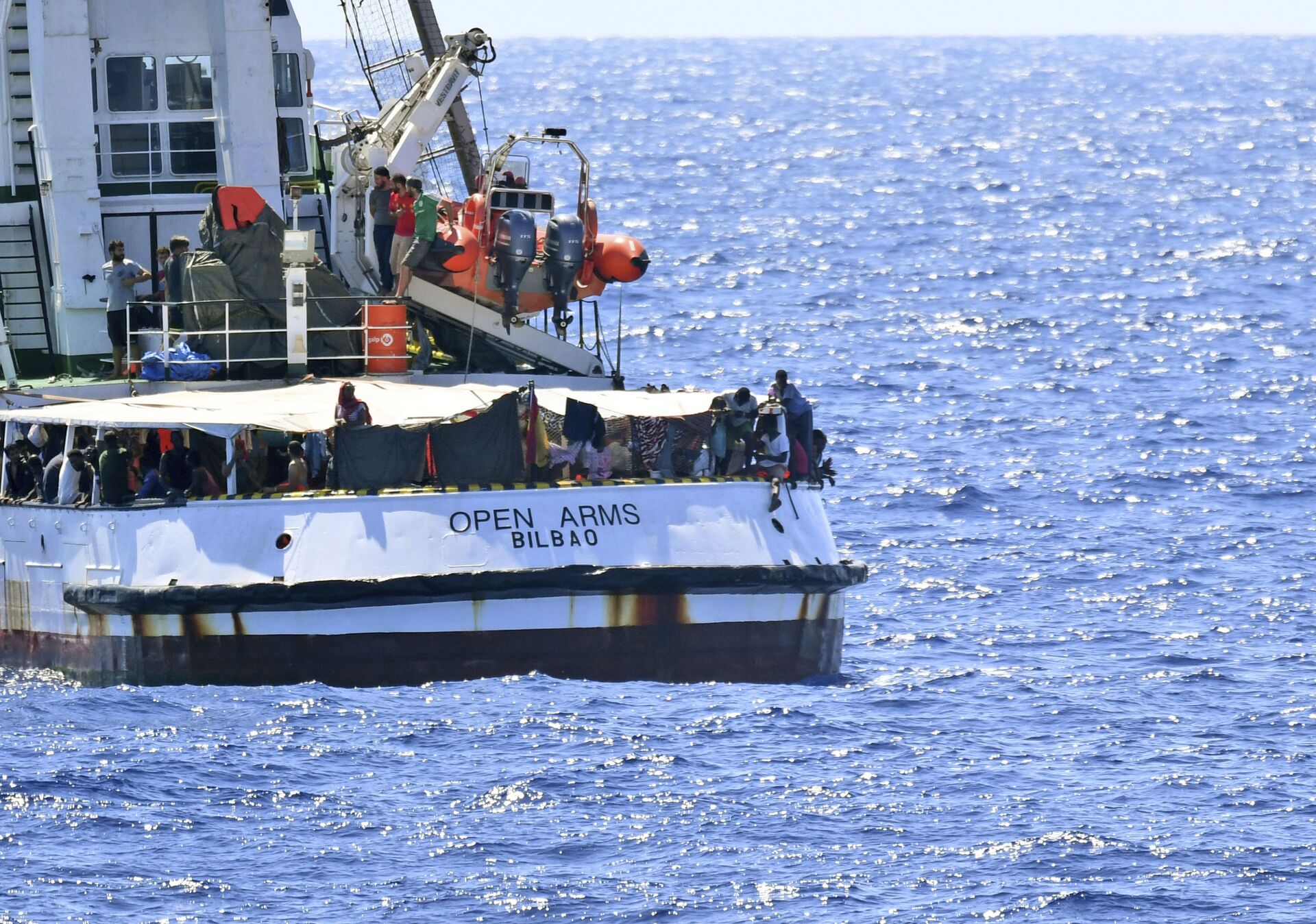MSF's Rescue Operations in Mediterranean 'Filling Gap' Left by EU Policy on Migrants: Representative
11:34 GMT 20.07.2021 (Updated: 12:21 GMT 09.02.2023)

© AP Photo / Emilio Morenatti
Subscribe
MOSCOW (Sputnik), Jonathan Rowson - Doctors Without Borders (MSF) is conducting search and rescue operations in the Mediterranean Sea in order to fill a "shocking" gap left by the European Union, Duccio Staderini, the organisation’s search and rescue representative, said.
MSF launched its search and rescue operations in the Mediterranean following the rapid upsurge in migrants and asylum seekers attempting to reach Europe that began in 2015. This followed the discontinuation of the Italian navy’s Mare Nostrum operation, which was stopped due to a lack of funds.
"It is shocking to work in Europe today for an NGO like ours on a matter like this one, and it is shocking to see that there is a criminalization of humanitarian aid in 2021 in Europe," Staderini said.
Between 2015 and 2021, MSF has contributed to the rescue of more than 81,000 people, and Staderini said that the organisation is merely filling the gap left by the European Union and national governments.
"The reason why we are there is not that we like it, it is that there is a gap, and our job is to fill that gap," he said.
Coastal European nations such as Italy have been left to bear the brunt of the rapid upsurge in migrants and refugees attempting to reach Europe’s shores, and Staderini said that the bloc had to take greater responsibility to share the burden.
"It is a European responsibility and member states have to ensure that maritime inspections are not instrumentalized in a deliberate effort to block the lifesaving activities of SAR [search and rescue] NGOs, and also, that member states ensure that coastal states are sufficiently supported to cover the gap. Then, we will stop our activities," he said.
The European Union’s Operation Sophia was launched in May 2015 to combat migrant smuggling routes off the coast of North Africa.
This mission was discontinued in 2020, and replaced by Operation Irini, which placed greater focus on enforcing the United Nations arms embargo on Libya.
Staderini said that with this change, the European Union is almost completely absent from migrant and refugee search and rescue operations at this present time.
"Irini moved to the eastern part of the Libya search and rescue region, reducing the likelihood of encountering and rescuing refugees and migrants in distress at sea. In the first year of Operation Irini, Irini didn’t perform any rescues, so if you compare Sophia and Irini, we have a clear pattern of withdrawal from search and rescue activity by the European Union," the MSF representative said.
MSF Decries Link Between Italy’s Detention of NGO Rescue Vessels, Deaths in the Mediterranean
Italy’s decision to place a number of NGO search and rescue vessels in administrative detention can be linked to the rising number of migrants and asylum seekers dying along the Central Mediterranean migration route, Duccio Staderini said.
Staderini said that this rise in deaths could be linked to the Italian government’s decision to place a number of NGO search and rescue vessels, such as MSF’s very own Geo Barents ship, in administrative detention.
"Since 2019, the Italian authorities have conducted 16 port state controls on NGO and rescue vessels, and those led to administrative detention in 13 occasions. So, we’ve lost overall, since 2019, over 1,200 days of SAR [search and rescue] capacity in the Mediterranean. So we are obliged to denounce that while we are detained, people are dying. And the link between this administrative detention and the loss of life is clear and evident," MSF’s search and rescue representative said.
The Italian authorities placed the Geo Barents vessel in administrative detention on 2 July after inspectors claimed that they had found 22 deficiencies with the ship.

Spanish humanitarian Rescue Ship Open Arms off the Sicilian Island of Lampedusa
© AP Photo / Salvatore Cavalli
MSF is currently doing everything in its power to make the required changes, not because the organization recognizes the "legitimacy" of the inspectors’ findings but because the humanitarian organization is desperate to resume operations, Staderini said.
According to the representative, the Italian government considers search and rescue vessels as a form of "passenger transportation," but the MSF official noted that the humanitarian organization follows the United Nations Convention on the Law of the Sea, which obliges captains to rescue those in distress.
"They consider us as passenger transportation, and they want us to cover the requirements as if we are transporting passengers, but everybody knows we are not transporting passengers, and the law of the sea states that the captain driving his ship has a duty to intervene and rescue people endangered at sea, so this is not rightly recognized," he said.
MSF has called on the Italian government to release the Geo Barents, and other rescue vessels, from administrative detention.
The Geo Barents vessel rescued 410 people who showed signs of "extreme exhaustion and various vulnerabilities" during its operations on June 10-12, MSF said.
Migrant, Refugee Vessel Interceptions Off Libyan Coast Triple in First Half of 2021
The number of migrants and refugees who have been intercepted while crossing the Mediterranean Sea from North Africa to Italy tripled year-on-year during the first half of 2021, Staderini said, adding that the current conditions in Libya’s migrant detention camps forced the NGO to temporarily withdraw its services.
More than 13,000 people have been intercepted at sea and returned to Libya since the start of the year, according to data published by the International Rescue Committee, and Staderini said that this figure was three times more than the same period in 2020.
"What we know is that interceptions have tripled from January to June compared to last year. This is despite the fact that all the observers, in particular the UN and the High Commissioner for Human Rights, are stating that Libya is not a place of safety for the purpose of the disembarkation of people rescued at sea because it doesn’t grant them the right then to apply for asylum and to be, I would say, hosted in respect of international humanitarian law, rules and regulations," MSF’s search and rescue representative said.
Migrants and refugees attempting to make the arduous journey across the Mediterranean Sea are well aware of the risks that they are taking, indicating that they see no other option than to try and cross into Europe, Staderini noted.
"We believe they know that they are taking these risks, and if somebody chooses to board a rubber boat and risk shipwreck in order to cross the Mediterranean, of course, they must be motivated by the fact that they probably have no other option," he said.
In late June, MSF announced that it would withdraw its medical services from two migrant detention centres in Tripoli, citing an increase in violence against detainees and worsening humanitarian conditions.
"We know that the levels of violence and exploitation in which they are hosted in the detention camps in Libya are not acceptable and that forced us as MSF to withdraw from these camps a few weeks ago, after working there to offer medical assistance to the people detained in the centers," Staderini remarked.
In a press release published in June, MSF called on the Libyan authorities to put an end to violence and ensure an improvement in the conditions for refugees and migrants at both the Mabani and Abu Salim detention centers.
MSF Denies Rescue Operations in the Mediterranean Sea Encourage Migrants to Attempt Crossing
Doctors Without Borders (MSF) stands firmly against the opinion that running search and rescue operations in the Mediterranean Sea acts as a "pull factor" that encourages migrants and refugees to attempt the dangerous journey to Europe, the representative said.
"We are criticized because we are accused of being a pull factor, in terms of our rescue ships and by carrying out search and rescue in the Central Mediterranean, but we are absolutely convinced that this is not true. And when you look at the data, the numbers are not increasing when we are at sea or decreasing when we are not at sea," Staderini said.
The Italian government has long criticized NGOs for conducting search and rescue operations in the Mediterranean, accusing them of encouraging migrants and asylum seekers to make the journey.
Several NGO vessels, including MSF’s Geo Barents ship, are currently in administrative detention following examinations by Italian officials.
Additionally, the crew of any ship that completes a rescue operation in the Central Mediterranean at the present time, such as SOS Mediterranee’s Ocean Viking, is subject to a mandatory 10-day quarantine period upon their arrival at an Italian port.
"Currently there is no ship able to do search and rescue in the Central Mediterranean because most of the ships are either in detention for administrative reasons, or in quarantine for reasons related to COVID prevention, and the flows are still undergoing because people, if they take the risk to cross on an unseaworthy boat, do it regardless of the search and rescue capacity," Staderini said.
Despite the limitations placed on the operation of NGO vessels, migrants and refugees are continuing to attempt to cross into Europe, with reports of shipwrecks and deaths coming through almost every day, Staderini remarked.
"As we’ve seen in the last few weeks, we have information almost every day about shipwrecks and loss of lives, and this trend is worryingly increasing," MSF’s search and rescue representative said.
MSF’s Geo Barents vessel was detained by the Italian authorities on July 2. Inspectors said that they had identified 22 deficiencies with the vessel.
The International Organization for Migration announced last month that 741 migrants and refugees died while attempting to travel the Central Mediterranean route in the first six months of 2021, more than double the number of deaths for the same period last year.

